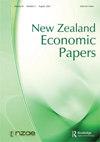过得更好吗?关于个人幸福感的有序数据的分布比较
IF 0.7
Q3 ECONOMICS
引用次数: 13
摘要
当用收入来衡量个人幸福感时,如何进行分配比较是公认的。但是,如果个人幸福感是用主观幸福感指标来衡量的,比如生活满意度或自我评估的健康状况呢?平均幸福感增加了还是幸福感不平等减少了?新西兰的幸福感分布与澳大利亚相比如何,或者与新西兰年轻人和老年人相比如何?经合组织等国际机构和包括新西兰在内的各国政府越来越重视主观幸福感指标,这篇论文探讨了这些问题。本文回顾了在有序数据背景下适用于分配比较的方法,并将其与通常用于比较收入分配的方法进行了比较。这些方法使用世界价值观调查的数据进行了说明。本文章由计算机程序翻译,如有差异,请以英文原文为准。
Better off? Distributional comparisons for ordinal data about personal well-being
How to undertake distributional comparisons when personal well-being is measured using income is well-established. But what if personal well-being is measured using subjective well-being indicators such as life satisfaction or self-assessed health status? Has average well-being increased or well-being inequality decreased? How does the distribution of well-being in New Zealand compare with that in Australia, or between young and old people in New Zealand? This paper addresses questions such as these, stimulated by the increasing weight put on subjective well-being measures by international agencies such as the OECD and national governments including New Zealand’s. The paper reviews the methods appropriate for distributional comparisons in the ordinal data context, comparing them with those routinely used for comparisons of income distributions. The methods are illustrated using data from the World Values Survey.
求助全文
通过发布文献求助,成功后即可免费获取论文全文。
去求助
来源期刊

New Zealand Economic Papers
Economics, Econometrics and Finance-Economics, Econometrics and Finance (all)
CiteScore
1.20
自引率
0.00%
发文量
17
 求助内容:
求助内容: 应助结果提醒方式:
应助结果提醒方式:


